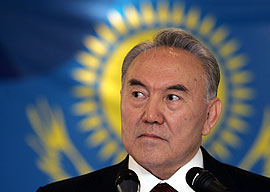Nazarbayev invites India Inc to invest in Kazakhstan without shyness
 New Delhi : Emphasizing Kazakhstan's choice to progress through its own model of development and highlighting the landmark achievements of a once raw material supplying country over a period of seventeen years, its visiting President, Nursultan Nazarbayev, said on Saturday that captains of Indian industry should not hesitate or be shy of taking advantage of the positive investment climate in Kazakhstan.
New Delhi : Emphasizing Kazakhstan's choice to progress through its own model of development and highlighting the landmark achievements of a once raw material supplying country over a period of seventeen years, its visiting President, Nursultan Nazarbayev, said on Saturday that captains of Indian industry should not hesitate or be shy of taking advantage of the positive investment climate in Kazakhstan.
Addressing participants at the Indo-Kazakh Business Forum, which was held in the Maurya Sheraton Hotel here this afternoon, President Nazarbayev described the Indian Government's invitation to him to be the chief guest at this year's Republic Day parade on Monday as a great honour. He said it was an indication of the close bilateral and strategic ties that Kazakhstan and India share and enjoy.
While recalling Kazakhstan's growth story since the break up of the erstwhile Soviet Union in 1991, President Nazarbayev said that over the past 17 years, his country had faced at least three major crises i. e. 1991-92, 1998 and now in 2008, and these challenges had been surmounted, or are being surmounted with aplomb. He attributed the recoveries to a planned reform process and to a focus on key sectors such as manufacturing, natural and mineral resources, infrastructure, oil, gas and uranium deposits, that were his country's strengths.
The fact that Kazakhstan and India had signed five agreements, including one to cooperate in the field of civil nuclear energy today, he said, suggests that the potential for cooperation between the two countries was largely untapped, and therefore, the scope for bilateral business to business activity was huge. He also emphasized that levels of cooperation should go beyond traditional items like oil and gas, and move into areas like textiles, agriculture, information technology, infrastructure, pharmaceuticals, metallurgy and dairy goods etc.
It was laudable that both countries have also been able to reach agreements on promoting cooperation in space and hydrocarbons, besides inking an extradition treaty and a protocol on accession of Kazakhstan to the WTO after decisive talks at the Hyderabad House here, he said.
The current global economic crisis, he said, was indicative of the emergence of a new world order, where regional forums are taking centre stage. In this scenario, both Kazakhstan and India, being large countries in terms of geographic expanse and enjoying healthy economic growth, have potential to exploit and nurture in not only business, but also in other areas of shared commonalities, he added.
Currently, he said, Kazakhstan shared 280 enterprises with India, including oil and natural gas. Though trade turnover between the two countries has expanded three times in the last year alone, in overall terms, he said, it was still small. President Nazarbayev said his country is fully supportive of India's quest for energy and for its peaceful use of civil nuclear energy. He assured that Kazakhstan would not be found wanting in this regard.
"Long-term cooperation (in supply of uranium) will lead to the solving of India''s problem of power," during the course of his address at the summit that was jointly organized by the CII, FICCI and ASSOCHAM.
He said that a significant step has been made in both countries witnessing the signing of an agreement for cooperation between state-run Nuclear Power Corp and uranium production company KazAtomProm.
Earlier, Minister of State for Industries, Ashwani Kumar was all praise for the support extended by Kazakhstan to India in the wake of last November's terror attacks on Mumbai as well as for New Delhi's quest for permanent membership in the UN Security Council.
Lauding President Nazarbayev's vision and sagacity in promoting purposive and progressive ties between his country and other parts of the world, Kumar said: "We are two nations united by history and commonalities, both have achieved economic growth, achieved inclusivist growth."
He further went on to say that India has a lot to offer, though investment in Kazakhstan was low at between 143 and 180 million dollars, and added that a significant step has been made through the signing of two agreements for cooperation in aerospace and uranium contribution.
Reflecting on the issue of terrorism, Kumar said that both India and Kazakhstan needed to move away from traditionalist approaches and promote a "global vision, a global approach, arrive at a global consensus and encourage global peace" to defeat this global scourge.
Saturday's summit meeting was also addressed by Azat Peruashev, President of the National Economic Chamber of Kazakhstan, who said: "We hope to extend the political ties into greater economic cooperation, which at present stands at minuscule figures of 180 million dollars."
Kazakhstan's Industry Minister V. Shkolnik said in his address that the visit of President Nazarbayev should be seen as a new stage in the development of Indo-Kazakh ties. He further said that both countries were developing at a fast pace, and therefore, there were major opportunities to take the trade turnover from 350 million dollars at present to a higher level.
He also dwelled on the importance of promoting civil nuclear trade between the two countries, especially in the wake of India being granted clearance to do so by the 45-member Nuclear Suppliers Group (NSG).
Economic progress between the two nations needs to be much more, he said, adding that one way to achieve this objective was through joint venture cooperation.
Former President FICCI, Yogendra Kumar Modi, and Chairman CIS Committee CII, Shiv Vikram Khemka, also addressed the gathering.
The event also saw the launch of the book "The Kazakhstan Way" in Hindi, authored by President Nazarbayev. (ANI)